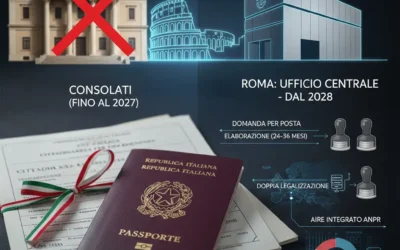Introduction
Buying property in Italy is a dream for many foreigners drawn by the country’s beauty, lifestyle, and heritage. Italy offers endless opportunities for those seeking a second home or investment abroad.
Yet, the process of buying property in Italy as a foreigner can quickly become complex. Legal rules, taxes, and notary procedures often differ from those in your home country. Understanding how Italian real estate transactions work — and what your rights and obligations are — is essential before signing a contract or transferring funds.
In this guide, you’ll find everything you need to know about the legal, tax, and procedural aspects of buying property in Italy, explained clearly by an Italian lawyer
Can Foreigners Buy Real Estate in Italy?
Yes, in general foreigners can purchase real estate in Italy. However, the conditions depend on several factors, such as your nationality, residence status, and the existence of reciprocity agreements between Italy and your home country.
If you are a non-EU citizen legally residing in Italy, for example with a residence permit or a residence card, you are allowed to purchase property, provided that you can show documentation proving your legal stay.
If you do not reside in Italy, things can become more complex. In these cases, the so-called reciprocity condition may apply. This means that Italy allows the purchase only if Italian citizens enjoy the same rights in your country. A Swiss citizen, for instance, may face limitations when trying to buy a second home in Italy, since in Switzerland such transactions by foreign residents are subject to approval by the local administrative authority. In similar situations, the reciprocity principle may not be deemed fully satisfied, and it is strongly advisable to rely on legal counsel.
For citizens of the European Union and the European Economic Area, the rules are simpler: there are no restrictions, and the purchase of property in Italy is always possible. Technically, EU and EEA citizens are not considered “foreigners” for these purposes.
As for citizens of countries such as the United States and the United Kingdom, there are no limitations, and they may buy real estate in Italy without restrictions. Canadians can also buy property in Italy, but certain aspects of reciprocity may require a careful review.
In conclusion, the possibility for a foreigner to buy real estate in Italy depends primarily on nationality and residence status. While in many cases the process is straightforward, in others it may involve an assessment of reciprocity or additional legal steps. For this reason, seeking professional legal advice before committing to any purchase is highly recommended.
Legal Risks in Italian Property Deals: What You Need to Know First
Italy’s legal and tax system can feel complex to foreign buyers, especially with language differences and unfamiliar procedures. But does this mean you always need to appoint a lawyer? The answer is: it depends.
In straightforward cases—for example, when buying a newly built property directly from a developer—much of the legal oversight is already handled by the notary, who is required by law to check the validity of the transaction.
However, in many other situations, especially when dealing with:
- Private sellers,
- Older properties with potential planning or cadastral issues,
- Contracts drafted by real estate agents, or
- Unclear clauses about deposits and conditions,
Having a bilingual property lawyer can make a significant difference. A lawyer’s role is not to replace the notary, but to protect your interests before you sign binding documents or transfer money.
Key takeaway: while it is not mandatory to appoint a lawyer in Italy, it can be highly advisable. Evaluating your specific case will help you decide whether legal support is a useful safeguard.
The Role of Estate Agents in Italy
In Italy, real estate agents (agenti immobiliari) play a central role in connecting buyers and sellers. Italian agents are typically entitled to a commission from both sides of the transaction. This fee is usually between 3% and 5% of the agreed price, though the exact percentage can vary.
While this system may feel unusual to foreign buyers, it is the standard practice under Italian law. What really matters is understanding when the fee becomes due. In most cases, payment is triggered as soon as a purchase offer is accepted—even before the final contract is signed.
This is why it’s important to carefully review any agency agreement presented to you.
Key takeaway: estate agents are valuable intermediaries in Italy, but their contracts should be reviewed with the same attention as any legal document. Having a lawyer check the terms before you commit ensures you know exactly what you’re agreeing to—and when payment will be due.
You can learn here what are the obligations and responsabilities of the real estate agent.
What Is the Codice Fiscale and Why Do You Need It to Purchase a Property in Italy?
When purchasing property in Italy, one of the first and most essential steps is obtaining a Codice Fiscale—the Italian tax identification number. This alphanumeric code is a mandatory requirement for any real estate transaction, regardless of the buyer’s country of residence.
The Codice Fiscale functions similarly to a Social Security Number in the United States: it uniquely identifies individuals in all financial, legal, and administrative matters within Italy. You must have it in order to:
- Sign the preliminary purchase agreement (compromesso)
- Execute the final deed before a notary (rogito)
- Register the property in your name
It is also required for other key operations such as:
- Opening a bank account in Italy
- Applying for a mortgage
- Paying property-related taxes
Although obtaining a Codice Fiscale is mandatory for property purchases, it does not automatically trigger tax obligations in Italy. Tax liability arises only if you are a resident, generate taxable income in the country, or hold taxable assets within Italian territory.
To obtain a Codice Fiscale, you can apply through:
- The Agenzia delle Entrate (Italian Revenue Agency)
- An Italian consulate abroad
You will need to present a valid ID and complete a simple application form.
Is a Surveyor (Geometra) Mandatory When Buying Property in Italy?
Unlike in some countries——appointing a Geometra (licensed Italian surveyor) is not legally mandatory in Italy when purchasing a property.
A Geometra is a technical professional who may be consulted to verify the property’s condition and compliance with planning regulations. Their involvement is particularly recommended in cases where:
- There are known irregularities or mismatches between the actual structure and what is registered with the Land Registry;
- Renovation or restructuring work is anticipated;
- The seller discloses existing issues or discrepancies.
However, it is equally true that the seller has a legal obligation to guarantee the conformity of the property with its cadastral documentation (planimetria catastale). This declaration must be made when listing the property with an estate agent and is reconfirmed at the time of sale.
A Growing Practice: Technical Reports Requested by Notaries
While not legally required, it is increasingly common in practice for Notaries to request a technical compliance report(relazione tecnica integrata) prepared by a qualified Geometra or architect. This document certifies that the property conforms to urban planning and cadastral regulations, offering an additional layer of protection for both buyer and seller.
For this reason, even though hiring a Geometra is not mandatory, it is often in practice required.
Starting the Negotiation: The Letter of Interest
Before drafting a formal contract, parties sometimes exchange a Letter of Interest. This document outlines the key terms of negotiation but may be binding or non-binding depending on its wording. It can be unilateral (prepared by one party) or bilateral (negotiated and signed by both).
Clarity is key: Ambiguous or poorly drafted Letters of Interest can lead to confusion or disputes. Please ensure any such document reflects your intentions precisely.
Due Diligence: Investigating the Property
Under Italian law, sellers must disclose known issues and guarantee that the property can be legally transferred. However, in practice, buyers are strongly advised to verify key aspects before signing. Doing so reduces the risk of disputes later and ensures that the property can be safely purchased.
Key points buyers should check include:
- That the property corresponds to its legal and cadastral description.
- That it is free from mortgages, liens, or other hidden liabilities.
- That title and ownership can be transferred without restrictions.
These checks must be conducted before signing the preliminary agreement.
Importantly, if a preliminary contract is signed before the buyer has completed their due diligence, they may face serious legal and financial risks. Issues discovered after this point—such as planning irregularities, non-conformity with cadastral records, or legal obstacles to ownership—can be difficult or impossible to resolve without incurring loss.
Even if these problems are technically covered by clauses in the preliminary agreement, the seller may resist making corrections or returning the deposit, leading to costly disputes.
For this reason, buyers are in a far stronger negotiating position before signing any contract or paying a deposit. At that stage, they still have the freedom to walk away, renegotiate, or request corrective action—without legal obligations or penalties.
Financing Options and Mortgage Considerations
If financing is needed, buyers can apply for a mortgage through an Italian bank or a lender licensed to operate in Italy. Non-residents should expect stricter terms, and in most cases, funding will not exceed 50% of the purchase price.
If the vendor’s mortgage remains in place, you’ll need to ensure it is cleared before completion—or, in some cases, negotiate a mortgage transfer (Accollo del Mutuo).
Securing the Purchase. How does it work
Step One: The Purchase Proposal – The First Binding Step in an Italian Real Estate Transaction
In Italy, the purchase proposal (proposta d’acquisto) is often the first formal document a buyer signs when moving forward with a property purchase. Though it may seem like a simple expression of interest, it carries legal and financial implications that should not be underestimated.
This document, drafted and presented through the estate agent, contains essential terms such as the identity of the parties, property details, proposed price, and deposit. It often includes specific conditions set by the buyer, such as making the offer subject to a successful mortgage application or to the outcome of legal and technical due diligence.
These clauses protect the buyer from becoming bound to a deal they cannot complete.
Once accepted by the seller, the proposal becomes legally binding
If done on a template of the real estate agent, it could include clauses that automatically convert the purchase proposal into a preliminary contract (compromesso) upon acceptance—effectively committing both parties to the sale and its terms. This conversion can happen without a separate contract being signed, catching some foreign buyers by surprise.
For these reasons, it is essential to treat the purchase proposal as more than a casual or exploratory step. Even if it’s presented as a “standard form,” its legal effects are significant, and a poorly worded clause or missing condition could expose the buyer to financial risk
Should the buyer back out, the seller may retain the deposit. If the seller withdraws, they may owe double the deposit.
Step Two: The Preliminary Sales Agreement
After the acceptance of the purchase offer, the next step is the signing of the Preliminary Contract (Contratto Preliminare or Compromesso).
This is a legally binding agreement that obligates both buyer and seller to complete the sale. It sets out the key terms of the transaction, including:
- the agreed purchase price,
- the deposit amount,
- the timeline for completion and signing of the final deed (rogito notarile).
At this stage, the buyer usually pays a deposit ranging between 15% and 20% of the purchase price.
- If the buyer backs out, the seller is entitled to keep the deposit or claim further damages.
- If the seller withdraws, they must return double the deposit.
Because of these consequences, the preliminary contract is what truly secures the sale. Unlike the initial offer, which may be less protective, the Compromesso guarantees that neither party can simply walk away without facing significant penalties.
For this reason, it is always advisable to have the contract reviewed by a qualified lawyer before signing. This ensures that the terms are fair, legally enforceable, and protect your interests throughout the buying process.
What Are the Registration Costs for the Preliminary Purchase Agreement in Italy?
The Preliminary Contract (Compromesso) must be registered with the Italian Revenue Agency (Agenzia delle Entrate) within 20–30 days of signing. Registration involves the following costs:
- Fixed registration tax: €200 (flat fee, not deductible).
- Stamp duty: €16 for every 4 pages or 100 lines, plus €1 for each attachment (e.g., floor plans).
- Proportional registration tax:
- 0.5% on the deposit (caparra confirmatoria).
- 3% on any down payment not subject to VAT (acconto prezzo).
Important: These proportional taxes are not an additional cost. They are treated as an advance payment toward the final registration taxes due at the time of the deed (rogito). The only amount that is not recoverable is the fixed €200 fee and the stamp duties.
Key takeaway: Registering the preliminary contract is mandatory, but the taxes you pay at this stage are essentially an advance on what you would have to pay anyway at completion.
Step three: Completion. Notary, Deed, and Final Steps
The final transfer of ownership occurs when the Deed of Sale (Rogito) is signed before a notary. Although selected by the buyer, the notary serves as a neutral public officer responsible for:
- Confirming the transaction’s legal validity.
- Reading the deed aloud. If one of the parties does not speak Italian, by law the deed has to be translated (which will add an extra cost to the process)
- Managing tax payments on behalf of the parties.
Final payment is made at this stage, typically by certified bank check (assegno circolare) or same-day wire transfer.
Purchasing a Property in Italy: Do You Need an Italian Bank Account?
While opening an Italian bank account is recommended for managing property-related expenses and making payments during the purchase process, it is not strictly necessary in every case.
Payments from foreign bank accounts are generally not allowed at the moment of signing the final deed. This is because the payment must be simultaneous (contestuale) with the execution of the sale, and only certain types of wire transfers executed from within Italy are legally considered non-revocable
For this reason, relying on an international bank transfer at the time of closing is generally not accepted. The safest and most legally compliant options are:
- Making the payment via an Italian cashier’s check (assegno circolare) issued by an Italian bank (for which you will need a bank account in Italy):
- Using a non-revocable domestic wire transfer executed through an Italian bank on the day of the deed
In these two cases you would of course need to open a bank account in Italy.
If you cannot open a bank account in Italy, the payment can be done through the Notar. They can temporarily hold the buyer’s funds in a dedicated account and then transfer the amount directly to the seller upon completion of the sale (rogito). This process ensures both security and compliance with Italian legal formalities.
Understanding Transaction Costs When Buying a Property in Italy
When buying property in Italy, expenses go beyond the purchase price. Buyers should budget for the following one-time transaction costs:
- Notary Fees: Usually between 1.5% and 3% of the sale price, depending on complexity and property value.
- Registration Tax (Imposta di Registro):
- 2% if you are buying as your primary residence (prima casa).
- 9% for non-residents or second homes.
- 10% or more for agricultural properties.
- VAT (IVA): Payable only on new properties purchased directly from a developer or company.
- 4% for residents buying as primary home.
- 10% for second homes.
- 22% for luxury properties.
Important: You pay either Registration Tax or VAT, not both. Which one applies depends on the seller (private vs. company).
- Land Registry & Mortgage Taxes:
- Flat-rate (€50–€200) if the seller is a private individual.
- Higher, percentage-based amounts if the seller is a company.
- Registration of the Preliminary Contract: Fixed and proportional taxes as explained earlier (mostly an advance on the final taxes).
Don’t forget ongoing costs: After the purchase, owners must also budget for recurring expenses such as IMU, TARI, and (if applicable) condominium fees.
What Are the Property Ownership Taxes and Costs in Italy?
When you purchase a property in Italy, it’s important to be aware of the ongoing taxes and costs that apply to homeowners. Two of the main taxes are IMU (Imposta Municipale Unica) and TARI.
IMU: Municipal Property Tax
IMU is typically payable on second homes or non-primary residences. The tax is calculated based on the cadastral valueof the property and a municipal rate, which varies by location. Payment is generally due in two installments: one in June and one in December.
Foreign buyers purchasing a vacation home or an investment property should budget for this recurring expense, even if the home is used only occasionally.
TARI: Waste Collection and Disposal Tax
TARI is a local tax that covers garbage collection and urban waste management. It applies to all properties, including primary residences, and is calculated based on the size of the property (square meters) and the number of occupants.
Even if the property is unoccupied for parts of the year, the tax is still due unless formally declared otherwise to the local municipality.
Condominium Expenses
Not all buildings have formal condominium structures with professional administrators. Under Italian law, a “minimum condominium” exists when a building has between 2 and 8 units owned by at least two different individuals.
The obligation to appoint a professional administrator arises only when there are more than eight individual owners(not units). This is based on the number of owners, not the number of apartments. So, if one person owns multiple units, they count as one condominium member
If you purchase a property within a condominium (condominio), you will be responsible for your share of the common expenses. These may include:
- Maintenance of shared areas (stairs, roof, elevator)
- Central heating, if applicable
- Shared services such as lighting or security
Even if you don’t use certain services, or are not living there full-time, you are legally obligated to pay condominium fees once you become the owner.
Conclusion
Purchasing property in Italy involves more than just agreeing on a price. Each step—from the proposal to the final deed—comes with rules, taxes, and procedures that are important to understand in advance.
By being aware of the process, the costs involved, and the documents required, buyers can approach their purchase with confidence.
Buying Property in Italy – FAQ
1. Can I buy property in Italy if I’m not an Italian citizen?
Yes! Foreigners can buy property in Italy, as long as Italians are allowed to buy property in your country (reciprocity applies).
2. Do I need an Italian bank account to purchase property in Italy?
Not necessarily. You can transfer funds directly from your international bank to the notary’s account, though having an Italian account can make payments smoother.
3. Is a deposit required to secure a property?
Typically, a deposit is paid when making an offer. Depending on the situation, it can sometimes be deposited directly with the notary instead of the seller or agent.
4. Do I need an Italian fiscal code?
Yes. You must obtain an Italian fiscal code before signing the final contract, as it’s required for the legal purchase process.
5. How long does it take to officially become the owner?
The timeline varies. If all documents are in order, it can be completed quickly, but delays may occur if paperwork is not in order
6. When can I move into my new property?
You can usually move in immediately after signing the purchase contract, when the keys are handed over.
7. Are properties sold furnished?
Most Italian properties are sold unfurnished, including kitchens. Some may be fully furnished on request or in specific cases.
8 Do I need a lawyer to buy property in Italy?
Legally, no. If you’re unfamiliar with Italian law or the buying process, hiring a lawyer is strongly recommended.





